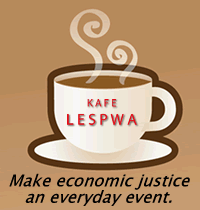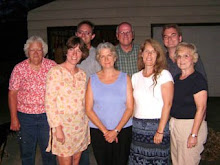by KaitlynWell, it’s my second to last week as a volunteer resident at the Worker, and I’m finally writing! My name is Kaitlyn and I will be a senior in college, majoring in Theology and International Peace Studies. Over Christmas break this past year, while exploring and discerning what the summer might hold for me, I stumbled upon two wonderful opportunities in Columbus:
Community Refugee Immigration Services (CRIS) -a non-profit Refugee Resettlement Organization - and The Columbus Catholic Worker at St. James the Less.
During fall semester I had volunteered at the
South Bend Catholic Worker with their Weather Amnesty program, spending the night with 10 homeless men once a month when the temperature was below freezing. It is an incredible community, focused on hospitality to the homeless, and I was touched so deeply every time I volunteered. When two people from home mentioned that they had heard of a Catholic Worker recently begun in Columbus, my heart leaped! I found this blog the night before I returned to school in January, stopped by to help sort clothes for the free store the next day, and emailed Frank shortly after with the daring proposal of living here this summer. He was enthused! I was welcome :) In the Spring I interviewed for an unpaid 8-week internship with CRIS, and embarked on both adventures on the 1st of June.
The past month and a half has surely been blessed, filled to the brim with lively, eclectic souls who have inspired and touched me in many ways. Growing up in the suburbs, I had never spent time in the part of Columbus where the Worker is located, surrounded by many immigrants, refugees, and low-income families. It has been eye-opening to be immersed in such cultural and social diversity, to see so much poverty and need in my home town, and to expend my energies doing such meaningful work.
The refugees I have worked with this summer at CRIS have truly been Christ in disguise. I have felt so intimate with Christ serving some of the poorest and most vulnerable members of our community. On days when I spend a lot of time doing paperwork, or behind a computer screen, simple moments of client contact give me so much joy and life. Some of my favorite moments…
A Muslim man from Sudan taking our Job Readiness class gently explaining the 5 pillars of Islam to me, and then pouring me a huge glass of juice, emptying the carton he had brought for his breakfast...
A Somali woman inviting me into her home, serving me a hot cup of milky tea, and spending 30 minutes communicating with hand gestures and teaching me words in her language...
Spending an afternoon with a Bhutanese family with 3 kids, enrolling them in school, and then taking them to the library to sign up for summer reading; the older boy singing Nepali pop songs with abandon in the car, and little 5 year old Sriza holding my hand and talking my ear off, though I didn’t understand a single word…
The refugee families often arrive directly from refugee camps where they have spent 2, 5, or even 17 years waiting for their case to be processed. They often arrive with nothing: no English, no home, no money, no job. We pick them up from the airport, find them an apartment… and my job is to prepare the apartment by getting them furniture, food, and a welcome basket. We also enroll the kids in school, teach a Job Readiness course and ESL, apply for social security and welfare benefits for the families, and help in any other ways we can.
Though they have little to nothing, the refugees have shown me more hospitality and generosity than I have ever encountered before. One day, my co-intern and I were on our way out of an apartment complex where many refugees live. An Eritrean woman wrapped in colorful cloth, with a gentle face worn by the sun and etched with wisdom and life, came outside and began speaking to my co-intern and I in Italian! She spent 2 years in Italy before coming to the US. My co-intern attempted to communicate in Spanish. Next thing I knew, she was inside the apartment, and I was being ushered in too, by the woman’s 28 year old daughter, Marta, who speaks some English. They placed a piping hot plate of Injera (a crepe-like flat bread) and a red, tomato-ey dipping sauce in front of us, then offered us coffee. The mother brewed Eritrean coffee in a beautiful Eritrean metal flask on the stove, plugged it with a piece of sponge to filter it, and, after scooping 2 giant spoonfuls of sugar into our little cups, poured us the most delicious coffee I’ve had since traveling in Italy! We drank it on a beautiful little wooden table, carved by Marta’s brother back in Eritrea. Before we left, we helped Marta understand and explain to her elderly neighbor the instructions for a hair-dying kit.
Marta and her mother have little possessions, struggle to get by, and yet shared so many beautiful gifts with us: the gift of their culture, their food, their home, their kindness. I couldn’t believe their hospitality, given to two complete strangers! It reminds me of Abraham in the 1st reading from this weekend, who runs out to greet the three visitors and bows to the ground in respect to invite them to stay and wash and eat. I wonder, “What if we all opened our doors to each other? What if we shared our food, our possessions, our homes, our cultures, with open hands, without fear? What if I approached each new person I met, each stranger that came to my door, with love and warmth in my eyes, as if I were greeting Christ himself?” Perhaps we would see more clearly that we belong to each other, that we are one human family… and that there is enough to go around.
My time at the Worker has also taught me about the gift of hospitality. It is amazing to live in a place where the door is always open; where people are always coming in and out, to drop off clothes or fresh vegetables, to volunteer, to hold a meeting, to receive food or clothing, to learn English or receive legal services…
I’ve been reading Dorothy Day’s autobiography,
The Long Loneliness, throughout the summer. Dorothy says something profound about Peter Maurin that I have been meditating on: "He made you feel that you and all men had great and generous hearts with which to love God. If you once recognized this fact in yourself you would expect to find it in others... It was seeing Christ in others, loving the Christ you saw in others. Greater than this, it was having faith in the Christ in others without being able to see Him. Blessed is he that believes without seeing."
The wonderful, unique people who form the foundation of this Catholic Worker community live believing in the Christ in others. Whoever happens to come to the door, whether a bubbly young college student, a family of Congolese refugees, or a woman suffering from abuse who lives down the street, I have seen them greeted with warmth and energy, given whatever food or drink or service they need, treated with a dignity and love they may not receive elsewhere. I am quietly challenged every day by my fellow Catholic workers to have faith in Christ in others, no matter how hidden He is, no matter how intimidating or different their outer appearance might be. If I approach each person with love and peace, rather than fear or defensiveness… that might bring out Christ in them, bring out their goodness that is hidden behind a tough exterior!
The days and weeks have flown by so quickly – I can hardly believe this brief and beautiful 2-month visitation will soon be over! Each day has gifted me with a new neighbor, a new friend, a deeper understanding of the experience of the poor and vulnerable, and a stronger sense of my identity and responsibility as a member of both a local and global community. Not to mention a stomach full of Somali bread or fresh-baked beets from the community garden! I am so incredibly grateful to the Catholic Worker community for welcoming me, teaching me, being patient with my busy schedule, loving me, and inviting me to offer my gifts to the community. Your openness and encouragement has really helped me to thrive and to make home these past few months.
As I reflect upon the joy of this journey, yet feel the winds of change coming, I am reminded of this quote, which I will leave you with:
Ours is the pain of constantly pitching our tent and folding it up again, of befriending strangers and bidding them goodbye, of loving the world but never being truly satisfied with it, of pouring our heart and soul into a project others have begun and still others will finish. If we would not be torn by the tension of this truth, we must learn to live provisionally- to measure the road well. We need to make the most of the occasions when we can gather by the roadside to break bread and compare directions. Joy must be discovered in the going as we never really arrive, not even in a lifetime.-Kristine Malins, medical missionary
 The Peaceable Kingdom by Fritz Eichenberg.
The Peaceable Kingdom by Fritz Eichenberg.



































